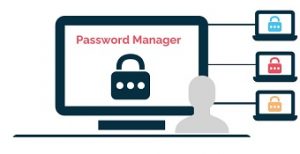
At least sixty percent of U.S. Adults don’t know how to protect themselves online, according to the Cal Poly Cyber Security Institute. With scammers and hackers working harder than ever, local experts are sounding off on what you can do to stay safe online.
Henry Danielson with the Cal Poly Cyber Security Institute says one in five people have had email or a social media account hacked. He says digital literacy is something everyone needs to learn, from “your dad to your grandma.” “The first line of defense is your password. Never reuse your password,” Danielson said. He recommends using a password manager, an app or program that keeps track of your passwords for you.
“Humans, as pattern seeking organisms, we don’t have enough brain power to be able to keep that many passwords in the back of our heads, so we actually should be using password managers.” And when you can, use two-factor authentication. That’s when you utilize a cell phone or other device to grant access to your account in addition to a password. “That second line of defense actually texts you a message.”
Hackers are increasingly targeting businesses with ransomware. Homeland Security Secretary Alejandro Mayorkas recently delivered this message to congress on the growing threat: ransomware attacks have increased by 300% over the last year, resulting in more than $300 million in losses.
Hackers can lock down a company’s files and say they won’t give them back unless ransom is paid. Vidur Kaushish is co-founder and COO of Maverick Space Systems. He says hackers will utilize seemingly legitimate emails to get your information. “They send out phishing emails. They look legitimate. They look like invoices from our vendors. They even have the names down right,” Kaushish said. He says there are ways to spot a phishing attempt.
“If you hover over a link you can see that it’s trying to take you to a suspicious site that’s going to ask you to enter information and take that information away from you.” Kaushish took a digital literacy class for small businesses at Cal Poly and made sure his employees were all trained to think before they click.
“If you don’t train for it. If you don’t prepare for it, and you don’t know what’s going on, you really get taken to the cleaners,” said Bill Britton, Director of the California Cybersecurity Institute. He likens cyber security to locking up your home: Don’t leave the door open and make it easy for those looking to take advantage. “It’s about training. It’s about being prepared and understanding what the most information you really want to protect is and then how to protect it. Not everything, because you can’t protect everything,” Britton said.











